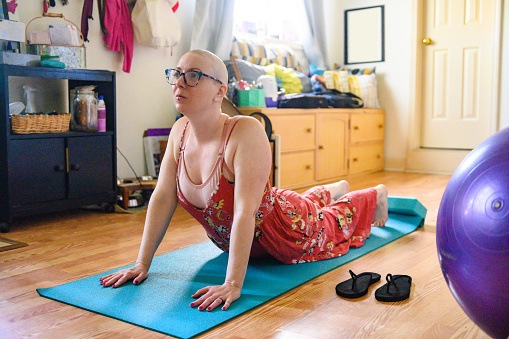
Researchers have outlined new exercise recommendations for cancer patients. The paper was published in A Cancer Journal for Clinicians.
“With more than 43 million cancer survivors worldwide, we have a growing need to address the unique health issues facing people living with and beyond cancer and better understand how exercise may help prevent and control cancer,” said lead researcher Kathryn Schmitz, professor of public health sciences at Penn State College of Medicine who is also a member of the Penn State Cancer Institute in a press release about the study. “This esteemed, multidisciplinary group of leaders on the forefront of exercise oncology aimed to translate the latest scientific evidence into practical recommendations for clinicians and the public and to create global impact through a unified voice.”
Exercise is important for cancer prevention and can lower the risk of developing colon, breast, endometrial, kidney, bladder, esophagus and stomach cancers. Exercise during and after cancer treatment can help improve fatigue, anxiety, depression, physical function, and quality of life, and can also help improve survival after a breast, colon or prostate cancer diagnosis.
The new initiative, called Moving Through Cancer, depends on the patient’s activity levels and abilities, the researchers generally recommend 30 minutes of moderately intense aerobic exercise three times a week and 20 to 30 minutes of resistance exercise twice a week.
However, Prof. Schmitz said health care professionals can also customize exercise prescriptions to individual patients.”Through our research, we’ve reached a point where we can give specific FITT exercise prescriptions — which means frequency, intensity, time and type — for specific outcomes like quality of life, fatigue, pain and others,” Schmitz said. “For example, if we’re seeing a head and neck cancer patient with a specific set of symptoms, we could give them an exercise prescription personalized to them.”
The recommendations are one result of a roundtable of experts formed by Prof. Schmitz and the American College of Sports Medicine (ACSM) to review the latest scientific evidence and offer recommendations about the benefits of exercise for prevention, treatment, recovery and improved survival for people living with and beyond cancer.
Exercise can now be prescribed like medicine for people with and beyond cancer – Penn State News https://t.co/ttilSQq5kF
— Medicine World (@MedicineWorld1) October 16, 2019
Prof. Schmitz said the recommendations will help with one of the premier goals of Moving Through Cancer – raising public awareness about the benefits of exercise for people living with and beyond cancer by 2029.
“Currently, an average person on the street will know that exercise is good for preventing and treating heart disease, but not for melanoma,” Prof. Schmitz added. “We want to change that. When researchers in the 1950s built an evidence base for exercise and heart disease, there was a shift in public knowledge about that connection. It’s now time for the same thing to happen with exercise and cancer.”
#Exercise can now be prescribed like medicine for people with and beyond #cancer @penn_state https://t.co/PRPn0aB9g0
— Medical Xpress (@physorg_health) October 16, 2019
Exercise Can Now Be Prescribed Like Medicine For People With And Beyond Cancer – https://t.co/FCYuBTNRqL Great writeup about #ExerciseOncology papers published today let by @fitaftercancer : https://t.co/5UZnDQwTnS @PennStHershey pic.twitter.com/KGXa3m0p1V
— Niraj J. Gusani, MD 🇺🇸 (@NirajGusani) October 16, 2019







 © 2025 Mashup Media, LLC, a Formedics Property. All Rights Reserved.
© 2025 Mashup Media, LLC, a Formedics Property. All Rights Reserved.